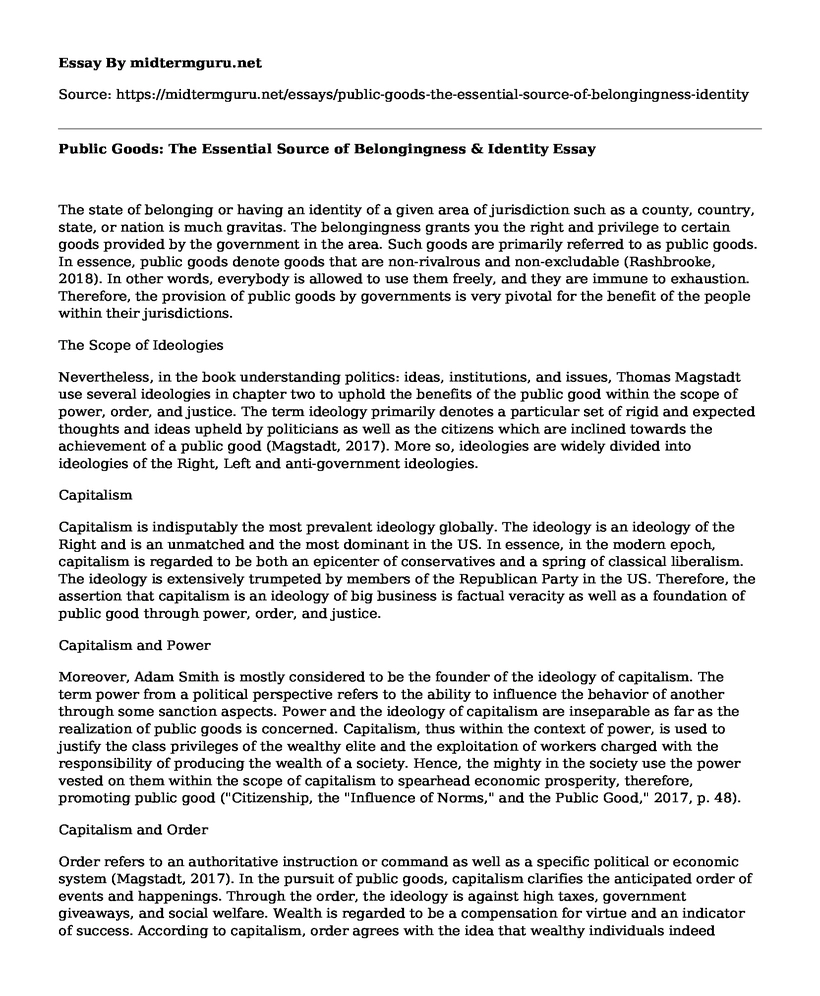The state of belonging or having an identity of a given area of jurisdiction such as a county, country, state, or nation is much gravitas. The belongingness grants you the right and privilege to certain goods provided by the government in the area. Such goods are primarily referred to as public goods. In essence, public goods denote goods that are non-rivalrous and non-excludable (Rashbrooke, 2018). In other words, everybody is allowed to use them freely, and they are immune to exhaustion. Therefore, the provision of public goods by governments is very pivotal for the benefit of the people within their jurisdictions.
The Scope of Ideologies
Nevertheless, in the book understanding politics: ideas, institutions, and issues, Thomas Magstadt use several ideologies in chapter two to uphold the benefits of the public good within the scope of power, order, and justice. The term ideology primarily denotes a particular set of rigid and expected thoughts and ideas upheld by politicians as well as the citizens which are inclined towards the achievement of a public good (Magstadt, 2017). More so, ideologies are widely divided into ideologies of the Right, Left and anti-government ideologies.
Capitalism
Capitalism is indisputably the most prevalent ideology globally. The ideology is an ideology of the Right and is an unmatched and the most dominant in the US. In essence, in the modern epoch, capitalism is regarded to be both an epicenter of conservatives and a spring of classical liberalism. The ideology is extensively trumpeted by members of the Republican Party in the US. Therefore, the assertion that capitalism is an ideology of big business is factual veracity as well as a foundation of public good through power, order, and justice.
Capitalism and Power
Moreover, Adam Smith is mostly considered to be the founder of the ideology of capitalism. The term power from a political perspective refers to the ability to influence the behavior of another through some sanction aspects. Power and the ideology of capitalism are inseparable as far as the realization of public goods is concerned. Capitalism, thus within the context of power, is used to justify the class privileges of the wealthy elite and the exploitation of workers charged with the responsibility of producing the wealth of a society. Hence, the mighty in the society use the power vested on them within the scope of capitalism to spearhead economic prosperity, therefore, promoting public good ("Citizenship, the "Influence of Norms," and the Public Good," 2017, p. 48).
Capitalism and Order
Order refers to an authoritative instruction or command as well as a specific political or economic system (Magstadt, 2017). In the pursuit of public goods, capitalism clarifies the anticipated order of events and happenings. Through the order, the ideology is against high taxes, government giveaways, and social welfare. Wealth is regarded to be a compensation for virtue and an indicator of success. According to capitalism, order agrees with the idea that wealthy individuals indeed deserve to be wealthy, whereas those who are poor are considered to be in that state due to idleness, frivolity, and lethargic. Hence, capitalism lays bare the order that individuals ought to adhere to the pursuit of public goods.
Capitalism and Justice
Justice is yet another aspect that cannot be separated from capitalism as far as the realization of public goods is concerned. Justice is principally the quality of being just, fair, or impartial (Magstadt, 2017). On the same accord, capitalism also refers to different things to different people (Rashbrooke, 2018). Regarding this, capitalism within the context of justice denotes the virtues of independence and freedom, innovation and invention, a reward for success, initiative, and individualism geared towards achieving public goods. Therefore, all individuals are granted just and equivalent opportunities to prosperity and accessibility to public goods.
References
Citizenship, the "Influence of Norms," and the Public Good. (2017). Public-Spirited Citizenship, 153-172. doi:10.4324/9781315127804-6
Magstadt, T. M. (2017). Understanding Politics: Ideas, Institutions, and Issues. Boston, MA: Cengage Learning.
Rashbrooke, M. (2018). Government for the public good: the core argument. Government for the Public Good: The Surprising Science of Large-Scale Collective Action, 8-32. doi:10.7810/9781988545080_1
Cite this page
Public Goods: The Essential Source of Belongingness & Identity. (2023, Jan 25). Retrieved from https://midtermguru.com/essays/public-goods-the-essential-source-of-belongingness-identity
If you are the original author of this essay and no longer wish to have it published on the midtermguru.com website, please click below to request its removal:
- American Utopia - Essay Sample
- Essay on Governmental Agencies
- Eating Pork Is Morally Unacceptable - Argumentative Essay
- Empowering Employees: Strategies for Leader Success - Essay Sample
- UHC: Ensuring Quality, Affordable Healthcare for All - Essay Sample
- Arranged Marriages in India: Pros & Cons in 21st Century - Essay Sample
- Paper Example on America's Social Classes: Unnecessary Evil







